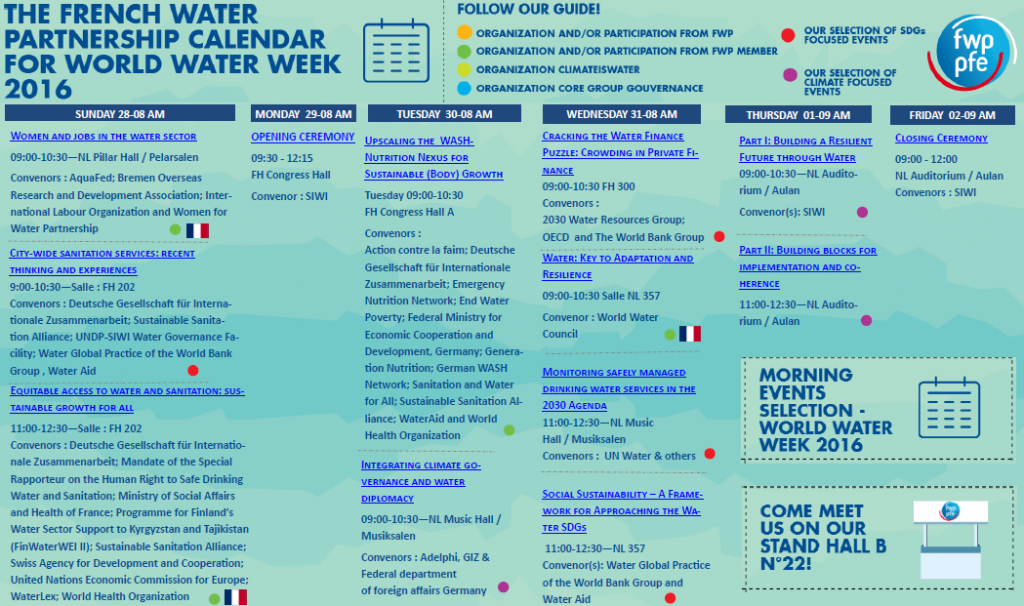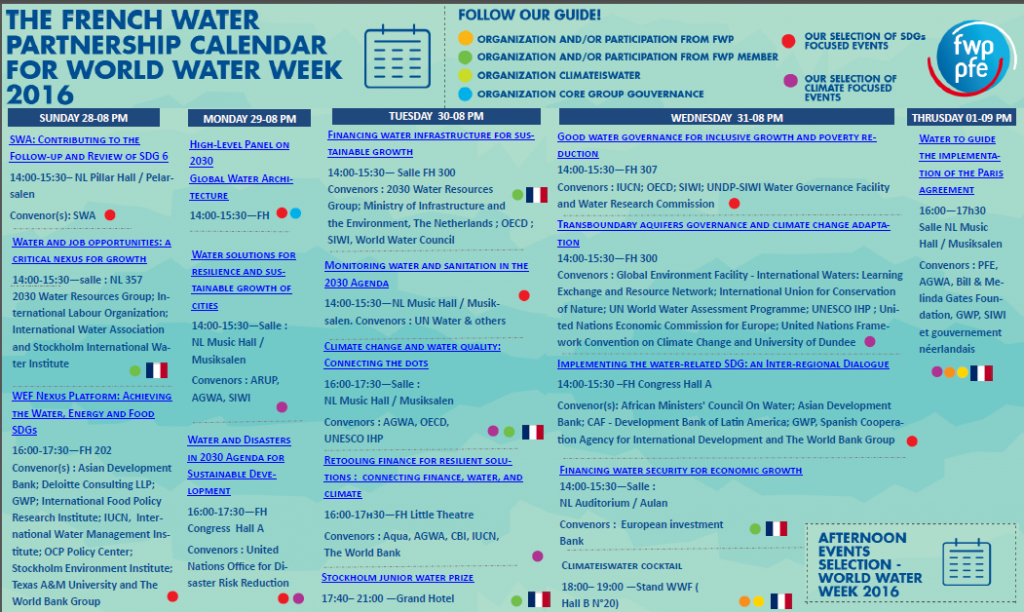Context
The World Water Week in Stockholm is organized every year by the Stockholm International Water Institute (SIWI). Since 1991, it has served as the annual focal point for discussions and talks on global issues that the water sector is facing.
Each year, more than 200 bodies hold meetings and sessions over the course of this week. Many stakeholders from the water sector in English-speaking countries attend the conference and discuss the technical, political, and scientific aspects of water resource management.
Theme of the year : sustainable growth
A specific theme is selected for each year.
While the theme for 2015 was “water for development,” reflecting the inauguration of the new Sustainable Development Goals, the 2016 edition will be dedicated to sustainable growth. It will be held from August 28 to September 2 at the International Fairs and Congress Center in Stockholm.
FWP communications
The FWP is a contributor to the [Water Report 2016], which is edited by the SIWI and will be distributed during World Water Week. You can find the FWP’s article on page 12.
Our conclusions
Slogan of the 2016 World Water Week:
“Implementation, Implementation, Implementation!”
The FWP delegation took away the following essential lessons from this 2016 edition:
- PRIORITIES The international water community is extremely involved in implementing the SDGs and the Paris Climate Agreement. It puts a strong emphasis on the need for coherence and complementarity between these two agendas, in alignment with the Sendai Framework (disaster risk reduction) and the Addis Ababa Action Agenda (financing for development) as well as the New Urban Agenda from Habitat III (sustainable cities).
- EDUCATION AND BEHAVIOR CHANGE This edition of the Water Week in Stockholm placed special interest on the role of education and the behavior changes needed for a paradigm shift.
- GOVERNANCE The water community calls for the establishment of global governance of the sector. Several ongoing initiatives were presented: 1/ CORE GROUP INITIATIVE: the creation of an intergovernmental committee with a political mandate on water at the United Nations, supported by the strengthening of UN-Water before the 2018 deadline 2/ HIGH LEVEL PANEL ON WATER: This panel consisting of 10 Heads of State was convened in January 2016 for a period of two years. Its purpose is to place water at the top of the international political agenda 3/ MEXICAN INITIATIVE of creating an IPCC for water. / The OECD’s recent recommendations constitute an essential foundation for governance at other levels (national, basin, and local levels). These recommendations were widely circulated.
- TRACKING COMMITMENTS MADE BY STATES Frequent recommendations have been made on the need to develop systems for sharing information on water in a number of countries to be able to implement sound policies and to track and monitor these policies on a regular basis. This would also make it possible to prepare global reports on this data.
- CIVIL SOCIETY Water stakeholders in civil society must organize and unite to be able to play a role in all the actions described above.
- FUNDING Currently there are nearly 90 bilateral or multilateral lenders from the development and climate sector that lend funds to projects focusing on water and sanitation. There is a need to simplify procedures, facilitate dialogue between lenders and project initiators, and to strengthen project initiators’ skills to be able to gain access to funding.
- THE NEED FOR A UNIFIED VOICE FOR WATER to be able to enter into a dialogue with other sectors (including climate, energy, and food safety), and to facilitate the integration of sectoral policies.
- URGENCY The importance of not separating development and urgency, and ensuring greater coherence between these two agendas, in particular through the WASH Cluster.
All these points are generally consistent with the messages presented by the FWP and its members. However, representatives from the governments of developing countries could have been given a more prominent voice so that they could present their points of view on implementing the UN framework on water in their countries.
The priority placed by FWP members this year on the FWP’s participation in the World Water Week in Stockholm was, once again, a wise move. The FWP delegation was able to get its messages across and to exchange with other participants. This week also represented an opportunity to make multiple bilateral contacts, and for the FWP’s executive secretariat to set up partnership agreements and to initiate new projects (GWP, Swiss Water Partnership, the Nownet event, and more).
The FWP and french delegation events during World Water Week


